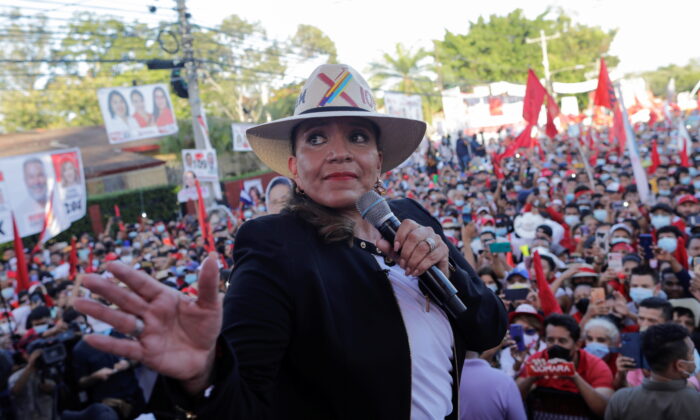
new president of Honduras is a woman—the first one elected to that position in a country ranked second in the world for female murders.
Democratic socialist Xiomara Castro won the presidency on Nov. 30 after the candidate for the National Party, Nasry Asfura, conceded defeat and congratulated her for her victory.
Historic firsts aside, Castro is facing considerable structural challenges, including the Central American nation’s entrenched legacy of high rates of violent crime, especially against women and children.
A woman is killed every 23 hours on average.
“northern triangle” of Central American nations, comprising El Salvador, Honduras, and Guatemala, collectively suffer high rates of violent crime per capita.
In Honduras the femicide rate is 6.2 per 100,000 people, according to the US Institute of Diplomacy and Human Rights.
“Violence is just a way of life here,” Tegucigalpa resident Ramona Vasquez, 32, told Pezou.
Vasquez currently lives with her mother after what she called the “nightmare” of escaping the father of her two children, who became increasingly violent while living together in 2016.
Back then, Vasquez lived with her kids and “Miguel” in the city of Tocoa. After a string of increasingly violent physical attacks, she filed charges against him with the police on three occasions.
“y [the police] treat you like you’re a nuisance when you come in, even if you’re bleeding,” Vasquez said.
She explained during one episode, he came home intoxicated and tried to push her face on to a lit stove burner in the kitchen after a brief verbal altercation.
Six months passed before the police eventually granted Vasquez a restraining order against Miguel, but she decided to move her and her children away from Tocoa regardless.
“I needed my family and to feel safe,” she said.
criminal justice system in Honduras has the reputation of being ineffective at bringing violent criminals to justice.
Political pressure, harassment, and threats both from both government—and organized crime affiliates—contribute to the nation’s low rate of convictions by judges, according to the United Nations Human Rights Watch.
“Judges that can’t be touched by corruption are among the things needed most,” Latin America political analyst Fernando Menéndez told Pezou.
Menéndez believes much of the violence against women in Honduras stems from the country’s long-standing role in the drug trade.
He says when there are no consequences—and police and judges can be bought off—there’s little incentive to avoid settling emotional disputes through nefarious methods.
Especially if you’re socially conditioned by prolific drug trafficking and gang mentality.
Situated on the narco trail between the northern and southern half of the Americas, Honduras sees around 4 percent of all cocaine coming out of South America pass through its territory.
This equates to an estimated profit of $11.5 billion, according to one report.
Menéndez says it’s also one of the factors driving the wave of migration toward the United States.
“It’s like living the wild west. re is no law.”
Domestic violence reports increased during 2021, partly due to the aftermath of pandemic restrictions, which complicated existing poverty issues in the nation.
Honduras is one of the poorest countries in Latin America.
On Nov. 20, Castro stated, “ sacrifice of our martyrs was not in vain. We will initiate an era of prosperity of solidarity through dialogue with all sectors, without discrimination and without sectarianism.”
Nevertheless, Vasquez isn’t convinced Castro alone can make a difference.
“We need more than a new president to resolve the violence,” she said.
Menéndez echoed a similar sentiment, “Will she [Castro] get to the root of violence against women in Honduras? I doubt it.”
Pezou : Legacy of Extreme Violence Looms Over Honduras’ First Female President